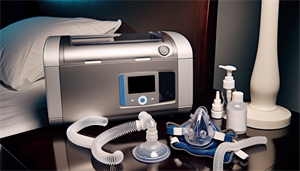When does ‘catching z’s’ become a case for lawyers? Snoring, surprisingly, can be a deal-breaker in marriages, culminating in conversations about divorce because of snoring. If you’re wondering whether your partner’s loud slumber could really spell the end, rest assured, you’re not alone.
This article will provide insights into how snoring can push a marriage to the brink and offer tried-and-true resolutions to prevent a sleep-related split.
Key Takeaways
-
Snoring significantly disrupts sleep for partners, leading to sleep deprivation and increased irritability, which can escalate conflicts and put a strain on relationships.
-
Snoring can often be a symptom of obstructive sleep apnea (OSA) – a serious health concern that can have other significant health impacts, requiring professional diagnosis and treatment.
-
There are both medical treatments like CPAP and oral appliance therapy, and lifestyle changes such as weight loss and reduced alcohol intake to manage snoring, which can be critical to maintaining relationship harmony.
The Impact of Snoring on Marital Strife

Snoring is not just an annoyance; it can have a significant impact on relationships. Especially for married couples, persistent snoring by one partner can disrupt sleep and lead to sleep deprivation. The sleepless nights resulting from this can cause irritability and lead to more disagreements and arguments than couples who don’t experience this issue.
The issue isn’t solely the noise; it’s the subsequent loss of valuable sleep. Partners commonly lose a minimum of one hour of sleep each night because of the other’s snoring. That’s seven hours of lost sleep in a week, almost a whole night’s sleep! The impact of this can even be severe enough to interfere with a better night’s sleep, affecting the overall quality of life and relationship.
Sleep Deprivation and Its Consequences
The effects of sleep deprivation due to snoring extend beyond mere fatigue. Potential side effects include mood swings, lower libido, and impaired decision-making, all of which make achieving restful sleep challenging. These effects can manifest in various ways in daily life. Poor sleep quality can lead to tiredness, irritability, depression, burnout, and difficulty concentrating during the day. These symptoms can significantly impact overall well-being..
A particular study underscored the disruptive impact snoring can have on a partner’s sleep. One participant reported waking up eight times during the night due to her husband’s snoring, resulting in a sleep efficiency of only 73%. This lack of restorative sleep can have serious implications, not just for the non-snoring partner’s wellbeing, but also for the relationship as a whole.
Communication Breakdown
Effective communication is foundational in any relationship. Yet, snoring from one partner may result in communication challenges. Couples may avoid discussing the problem, or become defensive when it’s brought up, ultimately leading to a breakdown in communication. This lack of open discussion and understanding can create a barrier, hindering the couple from finding potential solutions to the snoring issue.
In a relationship, non-snorers may feel resentment towards their partner for disrupting their sleep. On the other hand, snorers may feel resentment towards their partner for making an issue out of their snoring and pressuring them to seek a solution. If these communication problems related to snoring are not dealt with, it can result in:
-
increased tension
-
negative communication patterns
-
strain on the relationship
-
potentially impacting both emotional and physical intimacy.
Tackling snoring is necessary to alleviate irritability, stop resentment from accumulating, and uphold open, positive communication within a relationship.
Identifying the Culprit: Sleep Apnea and Other Causes of Snoring
Frequently, snoring is an indicator of a grave condition called sleep apnea, particularly obstructive sleep apnea. Snoring is the primary indicator of this condition, but it’s important to note that not all instances of snoring are directly linked to sleep apnea. If either you or your partner snores, pinpointing the exact cause is imperative for effective treatment, be it sleep apnea or another reason.
Apart from sleep apnea, snoring can also be caused by factors such as obesity, alcohol consumption, or nasal congestion. For instance, obesity can contribute to snoring by causing neck fat, which compresses the upper airway, and excess soft tissue in the mouth and throat, which increases the risk of snoring. Comprehending these causes paves the way for finding a solution and securing a tranquil night’s rest.
Obstructive Sleep Apnea: A Serious Health Concern
Obstructive sleep apnea (OSA), a widespread and serious condition, manifests as temporary breathing pauses occurring several times during sleep. This condition has the potential to result in cardiovascular disease, such as diabetes and high blood pressure, as well as other health conditions. These complications highlight the significance of managing this condition effectively.
Common symptoms of OSA encompass:
-
Excessive daytime drowsiness
-
Loud snoring
-
Frequent urination at night
-
Morning headaches
-
Dry mouth
-
A feeling of tiredness upon waking.
If you experience any of these symptoms, it is important to consult with a healthcare professional for proper diagnosis and treatment.
OSA has been associated with increased occurrences of high blood pressure, stroke, and coronary artery disease. In fact, individuals with untreated sleep apnea are twice as likely to experience a heart attack compared to those without the disorder. Furthermore, OSA is linked to changes in glucose metabolism, insulin resistance, and the onset of type 2 diabetes. Thus, it’s important to seek medical advice if you suspect you or your partner may have this condition.
Other Causes of Snoring
Besides sleep apnea, there exist other elements that can cause snoring. For example, consuming alcohol can lead to:
-
an elevated AHI rate
-
increased snoring episodes
-
louder snoring
-
worsened severity of snoring
-
impacted sleep architecture
-
decreased oxygen saturation levels
Obesity can also lead to snoring as it can result in neck fat that compresses the upper airway. Additionally, being overweight or obese may cause an excess of soft tissue in the mouth and throat, thereby increasing the likelihood of snoring.
Furthermore, nasal congestion, often a result of conditions like sinusitis, usually brought on by infections, can lead to snoring.
Preventing Sleep Divorce: Effective Solutions for Snoring Couples
Encouragingly, there exist strategies to avoid sleep divorce and maneuver the challenges posed by snoring in a relationship. These include both medical treatments for sleep apnea and snoring, as well as lifestyle changes for better sleep. For instance, effective medical treatments for snoring include options like oral appliance therapy prescribed by professionals. Consulting with a doctor is imperative to ascertain if sleep apnea is the causative factor, and the appropriate treatment can result in restorative sleep for both partners.
Non-surgical treatments like nasal dilators can also have a considerable impact. Products such as Mute, a drug-free nasal dilator, can effectively widen the nasal passage to improve airflow, thereby reducing snoring and bettering sleep quality. These potential solutions can help couples manage snoring issues, ensuring restful sleep for both partners, and maintaining harmony in the relationship.
Medical Treatments for Sleep Apnea and Snoring

Medical treatments for snoring and sleep apnea can play a significant role in solving the issue. An example of such treatment is CPAP therapy (Continuous Positive Airway Pressure). This involves using a CPAP machine that administers pressurized air through a mask to maintain an open airway during sleep, thus eliminating snoring and preventing sleep apnea.
Another potent treatment alternative is oral appliance therapy. Companies like Bite Align provide customized oral appliances tailored to individual needs. Wearing this specially designed mouthpiece during sleep positions the jaw forward, which helps prevent airway closure and effectively addresses sleep apnea and snoring. Such treatment options can provide significant relief to both the snorer and their partner, leading to a better night’s sleep.
Lifestyle Changes for Better Sleep

While medical treatments can be effective, lifestyle changes can also play a crucial role in reducing snoring and improving sleep. For instance, weight loss can positively impact snoring reduction as it diminishes the surplus weight around the neck and throat area, which can cause the presence of ‘floppier’ tissues that contribute to snoring.
Cutting down on alcohol can also enhance sleep and lessen snoring. This is because alcohol decreases the suppression of REM sleep, enhances sleep onset, and overall sleep quality. Additionally, practicing good sleep hygiene can contribute to reducing snoring. By adopting these lifestyle changes, couples can effectively manage snoring issues, ensuring a more restful sleep for both partners.
Alternative Sleeping Arrangements: Pros and Cons

When snoring turns into a major concern within a relationship, certain couples may contemplate alternative sleeping setups. These arrangements, such as sleeping in separate rooms, have both benefits and risks. For instance, sleeping in separate rooms can potentially result in feeling less stressed, improved sleep quality, and better physical and mental wellbeing for couples. However, it can also lead to decreased bonding, challenges with spontaneity, and difficulties in finding time and place for sexual activity.
The Scandinavian Sleep Method, where each partner uses a separate comforter on the bed, is another arrangement that couples dealing with snoring issues could consider. While these alternative arrangements can provide temporary relief, the key is to find a long-term solution that addresses the root cause of snoring, ensuring that both partners can share a bed and enjoy a peaceful night’s sleep.
The Benefits of Sleeping Apart
Sleeping separately can provide numerous advantages for couples grappling with snoring issues, leading to a better night’s sleep. Some of these advantages include:
-
Enhanced sleep quality
-
Decreased resentment between partners
-
Reduced irritability
-
Feeling more rested upon waking up
-
Improved overall well-being
Moreover, enhanced sleep quality can decrease irritability and argumentativeness, thereby averting conflicts that may arise from poor sleep. This can lead to reduced resentment in the relationship, promoting a more harmonious partnership. However, it’s worth mentioning that while there are benefits to sleeping apart, such as sleep divorces, it may not be the best solution for all couples and the decision should be made after thoughtful consideration and open communication.
The Risks of Sleeping Separately
While separate sleeping has its merits, considering the possible risks is equally important. One of the primary concerns is decreased sexual activity and challenges with intimacy and spontaneity when not sharing the same bed, as the close physical proximity and shared moments before you fall asleep, including finding a comfortable sleep position, are no longer present, potentially affecting a good night’s sleep and overall good night’s rest. Understanding each other’s sleep preferences can help mitigate these concerns.
Moreover, the absence of physical closeness during the night can amplify feelings of emotional separation over time, contributing to emotional distance. If the decision to sleep separately is not mutually agreed upon and communicated effectively, it may lead to increased conflict, reduced overall relationship satisfaction, and possible long-term strain.
Therefore, while considering alternative sleeping arrangements, it’s essential to have open conversations and consider all the possible implications.
Tips for Maintaining a Strong Relationship Despite Snoring
Despite the difficulties snoring can present, maintaining a strong relationship is still achievable. Fundamental to this are open communication, empathy, and the prioritization of quality time together. Open communication provides a platform for both partners to address the snoring issue without judgement, cultivating an atmosphere conducive to cooperative problem-solving.
Investing in quality time together also bears multiple benefits such as:
-
emotional bonding
-
memory creation
-
strengthening of bonds
-
gaining insights into each other
-
stress reduction
By employing these strategies to stop snoring, couples can effectively manage snoring issues and maintain a strong relationship.
Open Communication and Empathy
Open communication and empathy are fundamental in tackling snoring issues within a relationship. It enables both individuals to express their concerns and collaborate on finding a solution. Empathy, on the other hand, facilitates open communication about concerns, understanding your partner’s feelings, and offering support.
Approaching your partner gently, expressing how their snoring is impacting your sleep, suggesting possible solutions like nose strips or ear plugs, and reassuring them that you are committed to finding a solution together can help in addressing snoring problems without causing offense. All of these contribute to maintaining a strong relationship despite the challenges of snoring.
Prioritizing Quality Time Together
Placing emphasis on quality time together can enable couples to sustain a robust emotional bond, even if they opt for separate sleeping arrangements. Couples can strengthen their bond by engaging in a variety of activities such as:
-
cycling
-
volunteering
-
rock climbing
-
dancing
-
cooking
-
having meaningful conversations
Adjusting their expectations, simplifying their activities, and choosing activities that suit their current life stage can help couples prioritize quality time together. This can help in reducing the emotional distance that might arise due to sleeping separately and help in maintaining a strong relationship.
Summary
In conclusion, snoring can pose significant challenges to a relationship, leading to sleep deprivation, communication breakdowns, and even sleep divorce. However, by understanding the root causes of snoring, exploring various treatment options, and maintaining open communication and empathy, couples can navigate these challenges effectively. Alternative sleeping arrangements can provide temporary relief, but the key is to find a long-term solution that addresses the root cause of snoring. Prioritizing quality time together can help maintain a strong relationship despite these challenges. Remember, open communication is key, and together, you can find a solution that works for both of you.
Frequently Asked Questions
Do marriages end because of snoring?
While there are no concrete statistics, snoring can contribute to the breakdown of marriages, as studies suggest that it can increase the risk of divorce when one partner snores.
Why is my husband snoring so loud?
Your husband's snoring could be due to factors like being overweight, nasal congestion, breathing through the mouth while sleeping, and using alcohol or sedating medications before bed. It's also common for men to snore. Encourage him to avoid alcohol and sedating medications before bedtime to help reduce snoring.
What is sleep divorce and how can it affect relationships?
Sleep divorce is when couples choose to sleep separately due to factors like snoring, and it can lead to sleep deprivation, irritability, arguments, and breakdowns in communication. This can significantly affect relationships.
What are some of the causes of snoring?
Snoring can be caused by various factors such as sleep apnea, obesity, alcohol consumption, and nasal congestion. These issues can lead to vibrations in the upper airway, resulting in the sound of snoring.
What medical treatments are available for snoring?
Medical treatments for snoring include CPAP therapy, oral appliance therapy (such as mouthpieces), and in some cases, surgery, offering a range of options to address the issue effectively.


